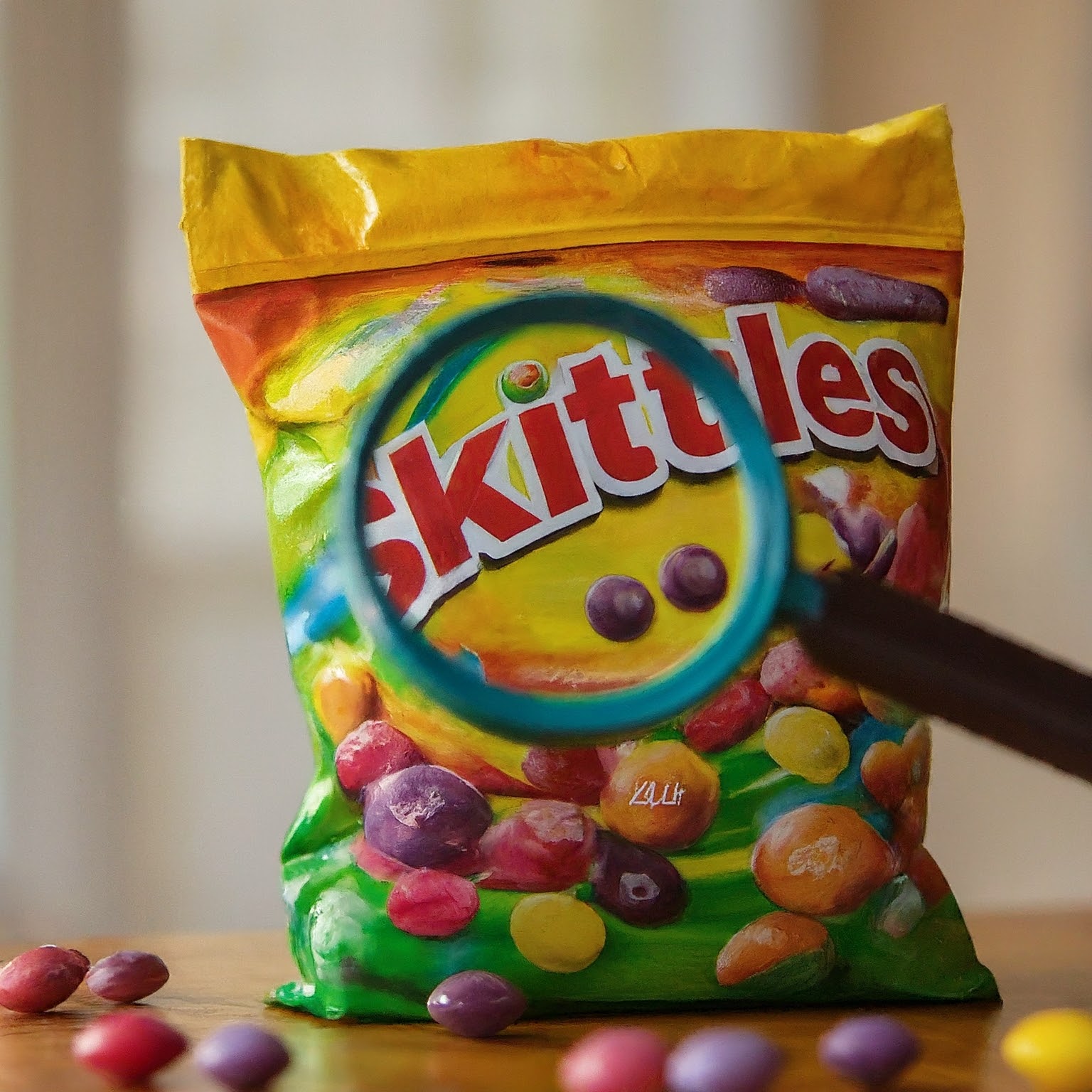are skittles halal
In today’s diverse global market, the question of whether popular products with animal ingredients, food additive, flavors, and food starch meet specific dietary laws is more relevant than ever. Among these queries, one stands out for consumers adhering to Islamic dietary guidelines: are Skittles, a popular candy with various fruit flavors, halal? This discussion not only touches upon the ingredients such as corn syrup and flavors used in Skittles, a popular candy, but also delves into the manufacturing processes and food additive that could affect their halal status. Understanding this aspect is crucial for Muslim consumers who strive to align their dietary choices with religious principles, specifically regarding perspectives on animal ingredients and flavors in services. The investigation into Skittles’ compatibility with halal standards reveals a complex interplay between food technology, religious directives, consumer expectations, flavors, colors, and perspectives, offering insights into how modern practices intersect with traditional beliefs.
Understanding Halal Status
Halal Criteria
Halal is a term from Islamic law. It means permissible. Foods that meet halal criteria, including specific flavors and brands, are allowed for Muslims to eat and are often listed in halal services. The rules are strict.
For meat to be halal, animals must be treated well and killed in a certain way. A Muslim must perform the slaughter for a halal diet by cutting the throat, windpipe, and blood vessels of the neck with a sharp knife while saying a prayer to God.
Besides humane treatment of animals, halal food cannot contain alcohol or certain animal products like pork. Cross-contamination with haram (forbidden) substances is also not allowed in the halal diet.
Skittles Ingredients
Skittles’ main ingredients are simple: sugar, corn syrup, and fruit juice. These components usually don’t raise concerns regarding their halal status.
However, Skittles also have less than 2% of food coloring and flavoring agents. This small percentage can cause big questions about whether they’re halal or not because some colorings and flavors might come from haram sources.
The ingredient list changes based on where you buy Skittles or which flavor you choose. This variation adds another layer of complexity when determining if their use is halal.
Manufacturing Processes
Skittles are made using both machines and human hands in factories around the world. The equipment could sometimes handle non-halal products too.
Shared use raises concerns about cross-contamination with haram substances. Even tiny traces of these forbidden materials would make Skittles non-halal according to Islamic law.
Packaging is designed carefully though. It aims to keep Skittles safe from contamination after leaving the production line until opening them at home.
Ingredients Analysis

Gelatin Implications
Gelatin is a common ingredient in many food products. It often comes from pork or animals not slaughtered according to Islamic law. This makes the product non-halal. Skittles, however, made a significant change in some regions by removing gelatin from their ingredients list.
This removal was crucial for Muslims who avoid animal ingredients that are not halal. The absence of gelatin in Skittles shows an effort to cater to diverse dietary needs and religious practices.
Corn Syrup Certification
Corn syrup is derived from corn starch through a chemical process. Its halal status depends on how it’s produced. Specifically, if alcohol contaminates it during production, it’s not halal.
For corn syrup to be considered halal, its manufacturing process must adhere strictly to halal standards. This includes avoiding any contamination with non-halal substances at all stages of production.
Citric Acid
Citric acid serves two main purposes: preserving food and enhancing flavor. Despite its widespread use, its halal status isn’t straightforward.
It can come from halal sources or be produced through fermentation involving alcohol. The key factor determining whether citric acid is halal lies in its source and how manufacturers produce it.
Tapioca Dextrin
Tapioca dextrin stabilizes candy coatings among other uses. Derived from the cassava plant, tapioca dextrin is generally considered halal due to its plant origin. However, like many other ingredients, the specific processing method determines if tapioca dextrin maintains its initial “halality.
Additives and Their Impact
Carnauba Wax
Carnauba wax is a plant-based wax. It gives candies like Skittles their glossy look. Because it comes from plants, it’s considered halal. This wax is used in small amounts to add shine and protect the candy.
Carnauba wax makes the candy appealing without affecting its taste. Its vegetable origin aligns with halal dietary laws, making it suitable for those following a halal diet.
Sodium Citrate
Sodium citrate acts as both a flavoring agent and preservative in foods. It’s derived from citric acid which is generally considered halal if sourced correctly. In candies, sodium citrate adds a slight tartness that balances sweetness.
The use of sodium citrate depends on its source being permissible under halal guidelines. It enhances flavors without compromising the dietary law’s integrity.
Hydrogenated Oil
Hydrogenated oil improves texture and extends shelf life of food products like candies. Vegetable-based hydrogenated oils are typically seen as halal because they originate from permissible sources. The process of hydrogenation doesn’t usually change this status.
This food additive ensures products remain fresh over time while maintaining quality standards acceptable within halal practices.
Color and Flavor Concerns
Artificial Colors
Artificial colors brighten up foods, including Skittles. These synthetic dyes make products more appealing. But their halal status is tricky. It depends on the dye components. Some artificial colors use alcohol-based solvents during processing.
This raises concerns for Muslims seeking halal options. Not all synthetic dyes are problematic, though. The key is verifying that no prohibited substances were used in making these colors.
For instance, a common dye might pass through an alcohol phase during its creation process. If this happens, it may not be considered halal anymore.
Natural Flavors
Natural flavors come from plants or animals. They don’t have synthetic additives, which seems good at first glance. However, if the flavor comes from an animal source, it must be halal-certified to be permissible for Muslims.
This means the animal was processed according to Islamic law. Verifying natural flavors’ sources and processing methods is crucial for them to be deemed halal.
Consider vanilla extract as an example of a natural flavor with potential issues. It often contains alcohol due to its extraction process from vanilla beans. Therefore, checking each ingredient’s origin and how it’s made becomes necessary when determining if something like Skittles is truly halal.
Vegan and Vegetarian Perspective
Gelatin Free
Skittles, being gelatin-free, marks a significant step towards catering to diverse dietary needs. This absence of gelatin not only makes them more appealing to vegetarians but also increases their potential for halal compliance. For many followers of Islam, avoiding pork and its derivatives is crucial. By excluding gelatin, which is often derived from pork, Skittles become a viable option for those adhering to these dietary laws.
Moreover, the move away from using animal-based gelatin reflects broader changes in food production practices. It signals an effort by manufacturers to create products that are more inclusive. This inclusivity benefits not just those with specific religious or ethical dietary restrictions but also appeals to a wider audience looking for plant-based alternatives.
Vegan Suitability
The vegan suitability of Skittles further aligns them with some halal dietary standards by excluding all animal products. However, it’s important to note that the vegan label does not automatically guarantee halal certification. The use of alcohol in processing or potential cross-contamination issues can still pose concerns for strict adherence to halal guidelines.
Despite these challenges, offering a product free from any animal-derived ingredients provides an alternative for consumers prioritizing plant-based diets over time. Whether motivated by health reasons, ethical considerations regarding animal welfare or environmental concerns about resource-intensive livestock farming—vegan-friendly options like Skittles cater to this growing demand.
Religious Perspectives and Acceptance
Conservative Views
Conservative Muslims strictly follow Islamic dietary laws. They only eat foods with a clear halal certification. This group might not accept Skittles due to the absence of explicit halal labeling.
They worry about cross-contamination in factories too. Even if ingredients seem fine, the risk of mixing with non-halal items is a concern. For them, strict adherence ensures they respect their religious obligations without doubt.
Moderate Stance
Moderate Muslims take a balanced approach to food. They consider modern manufacturing processes when judging what’s permissible to eat. This group is more likely to accept Skittles based on an analysis of its ingredients rather than needing formal halal certification.
They are somewhat flexible about cross-contamination risks as well. If there are efforts to minimize it during production, they may still consider the product acceptable under Islamic law. Their perspective bridges traditional beliefs and practical living in today’s world.
Reformist Opinions
Reformist Muslims focus on intention and broader ethical issues over meticulous ingredient checks. They might weigh factors like environmental impact or animal rights when deciding if something is permissible to consume according to Islamic principles.
This view allows for a reinterpretation of dietary laws in light of current contexts and challenges. Products like Skittles could be deemed acceptable if they align with these broader values, even without specific halal certification.
Alternatives and Permissible Candies
Halal-Certified Options
Certain Skittles variants have received halal certification in specific regions. This certification is crucial. It ensures that these candies comply with Islamic dietary laws from start to finish. The process includes careful selection of ingredients, preparation methods, and packaging.
The availability of these certified Skittles varies greatly by market. It depends on the local demand for such products. In areas with a high Muslim population, you’re more likely to find them easily.
Certification offers peace of mind for those strictly following halal guidelines. They can enjoy their favorite candy without worry.
Vegetarian Alternatives
Vegetarian options serve as another alternative for Muslims looking at permissible candies. These exclude meat but may include other non-halal components like alcohol or gelatin derived from fish.
These alternatives provide a middle ground. They cater to those avoiding meat but not strictly adhering to all halal guidelines.
Labels are key here. They help identify which candies fit within broader dietary preferences including vegetarianism.
For instance, some popular candy brands offer “gelatin-free” versions of their products which might be suitable for vegetarians but still need scrutiny for complete halal compliance.
Debates and Concerns
Alcohol in Ingredients
The inclusion of alcohol in the ingredients of Skittles has sparked significant debate. Some flavorings or colorings may involve alcohol during their extraction or processing methods. This detail is crucial because even trace amounts can make a product non-halal according to strict interpretations of Islamic law.
Consumers concerned about halal compliance often seek transparency from manufacturers. They might contact companies directly through emails to inquire about specific ingredients. This direct communication helps them make informed choices that align with their beliefs.
Pork Derivatives
Another major concern revolves around pork derivatives such as gelatin, certain enzymes, or emulsifiers found in many food items, including candies like Skittles. The presence of any by-products originating from pigs automatically classifies these food items as non-halal.
Fortunately, the removal of pork derivatives from products has significantly increased their acceptability within Muslim communities. Manufacturers who have taken steps to eliminate these ingredients have seen a positive response from consumers seeking halal options.
Updated Halal Insight
Recent Certifications
Skittles has made significant strides in ensuring their products meet halal standards. This effort is part of a broader initiative to cater to Muslim consumers worldwide. Recently, Skittles received new certifications that highlight their compliance with these dietary laws. Such certifications are crucial as they reassure Muslim consumers about the permissibility of consuming these products.
The process involves rigorous scrutiny of ingredients and manufacturing processes to ensure no haram (forbidden) elements are present. For instance, gelatin derived from pork is a common concern in many candies but Skittles has worked to eliminate such ingredients from their production line where necessary. These changes reflect an ongoing commitment by brands like Skittles to be inclusive and respectful of diverse dietary needs.
Brand Statements
In response to consumer inquiries and concerns, Skittles has issued official statements regarding their dedication to inclusivity and respecting diverse dietary requirements. These communications clarify the steps taken by the company to ensure product suitability for Muslim consumers specifically.
Skittles highlights efforts such as changing ingredient sources or modifying recipes as proof of their commitment to meeting halal criteria across certain products. The brand’s transparency about which items are intended for this market segment not only builds trust but also educates consumers on making informed choices based on personal or religious dietary restrictions.
Closing Thoughts
The exploration of Skittles’ halal status through ingredients analysis, consideration of additives, color and flavor concerns, as well as perspectives from vegan, vegetarian, and religious viewpoints, underscores the complexity of dietary compliance within Islamic law. This comprehensive review highlights the importance of transparency and informed choices for consumers adhering to halal dietary guidelines. Alternatives and permissible candies offer viable options for those seeking compliance without compromising on taste or quality. The ongoing debates and updated insights into halal certification processes reflect a dynamic dialogue within the community, emphasizing the need for continuous education and awareness.
As consumers navigate the intricate landscape of halal confectionery, it is essential to engage with trusted sources and seek out certified products to ensure dietary adherence. The quest for halal-certified sweets like Skittles invites further discussion and exploration among consumers and producers alike, fostering a deeper understanding of halal principles in modern food production. Let this serve as a call to action for continued vigilance and curiosity in making informed dietary choices.
Frequently Asked Questions
Are Skittles considered Halal?
Skittles have not been officially certified as Halal. The ingredients and manufacturing processes do not fully align with strict Halal criteria.
What ingredients in Skittles might conflict with Halal standards?
Some colorings and gelatin, potentially derived from non-Halal sources, could conflict with Halal dietary laws.
Do Skittles contain any animal-derived additives?
Yes, certain flavors of Skittles may contain additives like gelatin, which is animal-derived and can be a concern for those following a halal diet.
Can vegans eat Skittles?
As of recent formulations, Skittles are vegan-friendly in many regions, avoiding the use of animal-based products like gelatin.
How do religious perspectives influence the acceptance of popular candy flavors, like Skittiles, with corn syrup?
Religious dietary guidelines significantly impact the acceptance of foods. Candies that don’t meet these guidelines, such as not being certified halal or kosher, may be avoided by adherents.
Are there any halal-certified alternatives to Skittles?
There are several candy brands that offer similar products to Skittiles which are certified halal and suitable for those adhering to Islamic dietary laws.
Have there been debates regarding the halality of skititles ?
Yes, discussions often arise around ingredient sourcing and manufacturing processes used for skititles , highlighting concerns within Muslim communities about their suitability.







